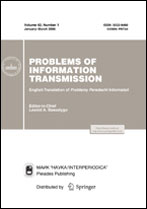|
|
Problemy Peredachi Informatsii, 2018, Volume 54, Issue 1, Pages 3–23
(Mi ppi2256)
|
|
|
 |
This article is cited in 10 scientific papers (total in 10 papers)
Information Theory
Strong converse for the feedback-assisted classical capacity of entanglement-breaking channels
D. Dinga, M. M. Wildeb
a Department of Applied Physics, Stanford University, Stanford, USA
b Hearne Institute for Theoretical Physics, Department of Physics and Astronomy, Center for Computation and Technology, Louisiana State University, Baton Rouge, USA
Abstract:
Quantum entanglement can be used in a communication scheme to establish a correlation between successive channel inputs that is impossible by classical means. It is known that the classical capacity of quantum channels can be enhanced by such entangled encoding schemes, but this is not always the case. In this paper, we prove that a strong converse theorem holds for the classical capacity of an entanglement-breaking channel even when it is assisted by a classical feedback link from the receiver to the transmitter. In doing so, we identify a bound on the strong converse exponent, which determines the exponentially decaying rate at which the success probability tends to zero, for a sequence of codes with communication rate exceeding capacity. Proving a strong converse, along with an achievability theorem, shows that the classical capacity is a sharp boundary between reliable and unreliable communication regimes. One of the main tools in our proof is the sandwiched Rényi relative entropy. The same method of proof is used to derive an exponential bound on the success probability when communicating over an arbitrary quantum channel assisted by classical feedback, provided that the transmitter does not use entangled encoding schemes.
Received: 07.07.2017
Revised: 20.10.2017
Citation:
D. Ding, M. M. Wilde, “Strong converse for the feedback-assisted classical capacity of entanglement-breaking channels”, Probl. Peredachi Inf., 54:1 (2018), 3–23; Problems Inform. Transmission, 54:1 (2018), 1–19
Linking options:
https://www.mathnet.ru/eng/ppi2256 https://www.mathnet.ru/eng/ppi/v54/i1/p3
|


| Statistics & downloads: |
| Abstract page: | 341 | | Full-text PDF : | 43 | | References: | 35 | | First page: | 20 |
|





 Contact us:
Contact us: Terms of Use
Terms of Use
 Registration to the website
Registration to the website Logotypes
Logotypes







 Citation in format
Citation in format 
